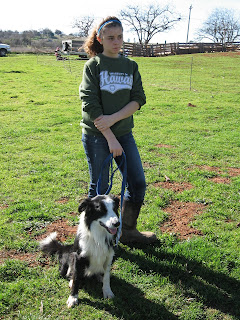What do homemade fried chicken, shearing sheep, building fence, driving a mule/horse and working a sheep dog have in common? They all require hands-on experience to do well! The Scottish folksinger, Dougie McLean says about learning to use the scythe, "It's not like you can go out and by the video "Scythe in a Day." The skills I've listed above are similar - they require lots of experience (perhaps a lifetime worth of experience) to do well.
I guess the other thing that these skills have in common is that they are both physical/manual and mental. Working a dog requires both a physical presence and total mental focus, as does driving a mule. When my great-grandmother Grace Fleming taught my Dad to fry chicken, she told him, "Mike, if you want to learn to do this, you need to be here at the stove the entire time - it's not something you can wander off and come back to." Similarly, John Erksine, a horse farmer / friend from Washington, says that driving a horse involves a lifetime of learning and the ability to be totally calm and totally present. As my Dad would say, "Be Here Now."
The other part of learning these types of skills is the importance of experience. Experience tells us what to expect in a given situation - and more importantly (if we're paying attention to our mistakes), how to respond. Experience (now) tells me that if my young dog splits off a sheep during a training session, I can let him retrieve the sheep as long as he's not abusing her. The first time something like this happened, I reacted poorly.
Finally, gaining skill and experience is often easiest when we're working with someone with more of both! Someone who has fried lots of chicken is a more effective teacher than a website or a cookbook. The physical nature of these skills requires tactile learning to be effective - a video about how to make homemade fried chicken can't describe how a piece of chicken drops off the fork when it's done.
Those of us who are trying to master skills like this have three responsibilities, I think (at least three). First, we must strive, as John Erskine says, to be totally present and totally calm. Second, we must always learn from what works (and from what doesn't work) - observation and adjustment are part of learning. Third, we must pass on what we've learned to a new generation. Even in a digital age, these types of skills are important!
Thoughts about sustainable agriculture and forestry from the Sierra Nevada foothills.
Subscribe to:
Post Comments (Atom)
-
Mo keeping track of our newest bummer lamb If you raise sheep, at some point, you'll have a lamb whose mother won't - or can...
-
Here's the next installment from my Sheep Management Basics talk: Overview – Why Not Lamb in a Barn? Conventional wisdom indicate...
-
On Sunday, I’ll make the two-hour drive to Auburn to participate in the Gold Country Fair’s Livestock Awards Ceremony. The Junior Livestoc...







No comments:
Post a Comment